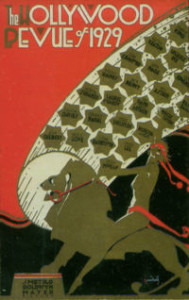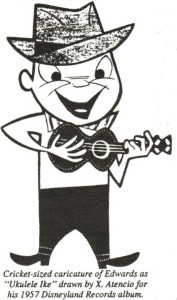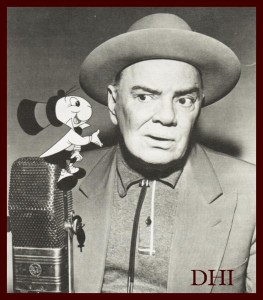Edwards was the 37th person tested for the role in Pinocchio, but he was well worth the wait. His performance of the Ned Washington-Leigh Harline tune earned the Walt Disney Studio its first Academy Award for Best Song (1940). Beyond the singing, the overall portrayal of the puppet’s conscience was so perfect that it practically demanded that the cricket continue to make other appearances.
Cliff Edwards spoke and sang for Jiminy in Fun and Fancy Free (1947), three series of informational cartoons on the original Mickey Mouse Club show (“I’m No Fool,” “Encyclopedia,” and “You, The Human Animal”) and countless television and radio guest spots.
Edwards’ first fame was not for this role, however. He was one of America’s first big recording stars as “Ukulele Ike,” performing not only schmaltzy love ballads but snappy pop tunes and blues. Between live touring vaudeville shows (including the Ziegfeld Follies), Edwards cut over 125 record “sides,” and reportedly sold close to 74 million copies between 1923 and 1933.
At the re quest of George Gershwin, Edwards introduced “Fascinating Rhythm” in the 1924 stage show Lady Be Good. Later, when talking pictures became the rage, Edwards created a sensation by introducing the new hit song “Singin’ in the Rain” in MGM’s first musical film, The Hollywood Revue of 1929.
quest of George Gershwin, Edwards introduced “Fascinating Rhythm” in the 1924 stage show Lady Be Good. Later, when talking pictures became the rage, Edwards created a sensation by introducing the new hit song “Singin’ in the Rain” in MGM’s first musical film, The Hollywood Revue of 1929.
With this great success came excess–his problems with drug use, wild living and frequent, short marriages were widely known in the Hollywood community. He had made and lost a fortune by the late 1930s. He managed to stay afloat by singing and/or acting in films, which included his portrayal of a “Reminiscent Soldier” in Gone With the Wind.
Pinocchio was his comeback, and a springboard to more success. Edwards was also the voice of the lead crow in Dumbo in 1941, and his ability to sing the real “down an’ dirty” blues without sounding stilted paid off. Disney animator and crow creator Ward Kimball remembers: “We were recording the track for the Black Crows… and we got [the Hall Johnson] choir from the Methodist Church in Los Angeles for it, and Cliff was the only white guy among them–he sounded more black than any of ’em…”
Edwards continued to randomly perform on stage and screen, but found his sagging career brought back again in 1954 when the first ABC Disneyland TV show aired, using Edwards’ original “When You Wish Upon A Star” recording as its theme. The Disney Studio reportedly received a landslide of mail wanting to know who the singer was, mostly from children. So, steady cricket work for TV, a few on-camera guest shots on the Mickey Mouse Club, and a lot of children’s recordings looked to spell security for Edwards.
It was not to be, because even though Disney press releases portrayed his bachelor life as happy and carefree, Edwards continued to have problems, especially with alcohol.
After Walt Disney’s death, both Edwards’ continual unreliability and a shift in the content of film and TV production pretty well severed his ties to Disney. His health deteriorated, and he died in Hollywood in 1971 at approximately 75 years of age.
All of the sad reality aside, Cliff Edwards was a tremendous talent, and an individual voice artist who made a great contribution to both film and Disney history. His personal problems never show in his performances as the voice of Jiminy Cricket, and when Disney had him re-record some of the jazz and tin-pan-alley material from his Ukulele Ike days in the late 1950s, the result would make you think it was the Roaring 20s all over again.
The Disney History Institute salutes the talents of Cliff Edwards–the man who brought wishing on stars back into popularity, and who to many is the sound of what Disney magic is all about.


I never realized that Jiminy Cricket was a caricature of Edwards.
iTunes has a good amount of his music for sale and it’s very fun stuff. My grandfather played the Uke on stage in similar fashion and got his start by entering Cliff Edward’s Ukelele Contest at his local theater. Was underrated for sure. Jack Black should do his life story on film!
I agree. Back in the “old” Days (pre-computer), I had collected a lot of his early 1930s music (having an affinity for the Harlem Jazz era of the Mills Brothers and so forth — which surprisingly in some cases, Edwards is considered part of). Technology is wonderful (yeah, over used cliche), but I checked iTunes as you suggested and was able to round up quite a few Cliff Edwards pieces I did not have. Curious if your grandfather won? Placed? And did he have a career with the Uke (since you stated “got his start”)? Thanks for your comments and the information. Paul